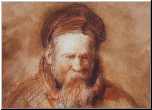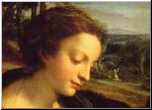   |
A TreatiseOn JusticePhilo Judaeustranslated by C. D. YongeI. One portion of justice, and that not an unimportant one, relates to courts of justice and to the judge, which indeed I have mentioned before, when I was going through the subject of testimony, and dwelling on it at some length, in order that nothing which belonged to the subject should be omitted; and as I am not fond of repetitions, unless indeed some necessity arising from the imperious character of the occasion compels me to it, I will pass that part of the subject over now, and will turn my attention to the other portions, having just said thus much as a preface. The law says, it is proper to lay up justice in one's heart, and to fasten it as a sign upon one's head, and as frontlets before one's eyes, figuratively intimating by the former expression that one ought to commit the precepts of justice, not to one's ears, which are not trustworthy, for there is no credit due to the ears, but to that most important and dominant part, stamping and impressing them on the most excellent of all offerings, a well approved seal; and by the second expression, that it is necessary not only to form proper conceptions of what is right, but also to do what one has decided upon as proper without delay. For the hand is the symbol of actions, to which Moses here commands the people to attach and fasten justice, saying, that it shall be a sign, of what indeed he has not expressly stated, because it is not a sign as I conceive of one particular thing, but of many, and, I may almost say, of everything with which the life of man is concerned. And by the third expression, he implies that justice is discerned everywhere as being close to the eyes. Moreover he says that, these things must have a certain motion; not one that shall be light and unsteady, but such as by its agitation may rouse the sight to the spectacle manifest before it; for motion is calculated to attract the sight, inasmuch as it excites and rouses it; or, I might rather say, inasmuch as it renders the eyes awake and sleepless. But the man to whom it happens to represent to the eyes of his mind things which are not quiet but which are in motion, and exerting energies in accordance with nature, is entitled to be set down as a perfect man, and no longer to be reckoned among learners and pupils, but among teachers and instructors; and he ought to allow all the young men who are desirous to do so, to drink of his wisdom as of an abundant stream flowing from a living fountain of lessons and doctrines. [Deuteronomy 6:7.] And if there is any one who, out of modesty, is wanting of courage, and therefore delays, and is slow to approach him for the purpose of learning, let him go to him of his own accord, and pour into his ears a collection of admonitions, until the channels of his soul are filled with them. And let him instruct in the principles of justice all his relatives and friends, and all young men, at home and on the road, and when they are going to bed, and when they rise up; that in all their positions, and in all their motions, and in all places whether private or public, not only waking, but also while asleep, they may be delighted with the image and conception of justice. For there is no delight more exquisite than that which proceeds from the whole soul being entirely filled with justice, while devoted to the study of its everlasting doctrines and meditations, so that it has no vacant place at which injustice can effect an entrance. Moreover, he ordains that those who have written out these things should afterwards affix them to every house belonging to a friend, and to the gates which are in their walls; that all people, whether coming in or going out, whether citizens or strangers, reading the writing thus fixed on pillars before the gates, may have an unceasing recollection of all that ought to be said or that ought to be done; and that every one may take care neither to do nor to suffer injury; and that all persons, whether going into their houses or going out of them, men and women, children and servants, may do all that is proper and becoming to one another and to themselves. THAT IT IS NOT LAWFUL TO ADD ANYTHING TO OR TO TAKE ANYTHING FROM THE LAWThe lawgiver also gives this most admirable injunction, that one must not add anything to, or take anything away from the law, but that it is a duty to keep all the ordinances as originally established in an equal and similar state to that in which they were at first delivered without alteration; for, as it seems, there might otherwise be an addition of what is unjust; for there is nothing which has been omitted by the wise lawgiver which can enable a man to partake of entire and perfect justice. Moreover, by this command Moses intimates the perfection of all other virtue; for each separate virtue is free from all deficiency, and is complete, deriving its perfection from itself; so that if there were any addition thereto, or anything taken away therefrom, it would be utterly and entirely changed and altered, so as to assume a contrary character. What I meant to say is this, all who are profoundly ignorant and uninstructed, all who have the very slightest smattering of education, know that courage is a virtue which is conversant about terrible objects; is a science teaching one what he ought to endure and dare. But if any one, under the influence of that ignorance which proceeds from insolence, should be so superfluous as to fancy himself capable of correcting that which requires no correction, and should consequently venture to add anything or take away anything, he, by so doing, is altering the whole appearance of the thing, changing that which had a good character into unseemliness; for by any addition to courage he will produce audacity, but if he takes anything away from it he will produce cowardice, not leaving even the name of courage, that most useful of all virtues to life. In the same manner, if any one makes an addition, be it ever so small, or ever so great, to that queen of the virtues, piety, or if he takes anything away from it, he will change and metamorphose its whole appearance, and make it something quite different; for any addition will engender superstition, and any diminution will produce impiety, real piety itself wholly disappearing under the operation, which every one should pray for, that it may be continually conspicuous and brilliant, since it is the cause of the greatest of all blessings, inasmuch as it produces a knowledge of the service of God, which one ought to look upon as more important and more precious than any dominion or authority. And we may give instances of every other virtue resembling what we have said about these just mentioned; but since I am in the habit of avoiding prolixity, [!] I will be satisfied with what has been stated, which may be a sufficient guide to what might be said respecting these virtues which we omit to mention. ABOUT NOT MOVING LAND-MARKSThere is also this commandment ordained which is of great common utility, that, "Thou shalt not move thy neighbors' land-marks which the former men have set up." [Deuteronomy 19:14.] And this injunction is given, as it seems, not only with respect to inheritances, and to the boundaries of the land, in order to prohibit covetousness respecting them, but also as a guard to ancient customs; for customs are unwritten laws, being the doctrines of men of old, not engraved on pillars or written on paper which may be eaten by moths, but impressed in the souls of those living under the same constitution. For the children ought to inherit from the father of their being the national customs in which they have been brought up, and in which they have lived from their cradle, and not to despise them merely because they are handed down without being written. For the man who obeys the written laws is not justly entitled to any praise, inasmuch as he is influenced by compulsion and the fear of punishment. But he who abides by the unwritten laws is worthy of praise, as exhibiting a spontaneous and unconstrained virtue. |